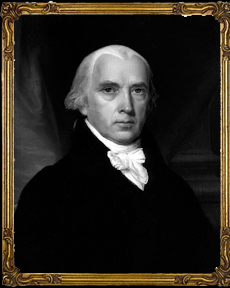
James Madison
Term Date: 1809-1817
Political Party: Democratic-Republican
Vice President: George Clinton, Elbridge Gerry
Born Place: Port Conway, Virginia
Born Date: March 16, 1751
Died Place: Montpelier, Virginia
Died Date: June 28, 1836
First Lady: Dolley (Payne) Todd
Children: 1 (from his First Lady's previous marriage)
Parents:
Other Political Offices:
Virginia Consitutional Convention, 1776
Continental Congress, 1780-83
Virginia Legislature, 1784-86
Member of the Constitutional Convention, 1787
Elected to the House of Representatives in 1789
Secretary of State, (under Jefferson)
Occupation before elected:
Lawyer
Brief History:
He lived all his life in Orange county on a 5,000-acre plantation that produced tobacco and grains. He got a education in Latin and Greek studies, and he also learned Christian ideas from his clergymen teachers. In Congress, he helped frame the Bill of Rights and enact the first revenue legislation. At age 29, Madison became the youngest member of the Continental Congress. As secretary of state, Madison supported the Louisiana Purchase, and the war against the Barbary pirates. As president Madison also had to overcome opposition that favored his friend James Monroe. He also drafted Washington's inaugural address and helped the president make the appointments of his first term. Throughout the war of 1812, Madison had to struggle with factions within his own party. The summer of 1814 brought to America thousands of battle-hardened British troops.
They fought vastly improved American armies to a standstill on the Niagara frontier and appeared in Chesapeake Bay intent on capturing Washington. When Madison returned to Washington after three days, he was cheered by word of the British defeat in Baltimore Harbor, the battle that inspired Francis Scott Key to write the words to the national anthem. To guide and stimulate the economy he recommended a recharter of the National Bank and recommended establishment of a national university and defense measures. He retired from Congress in 1797 to spend more time with his First Lady. In retirement, Madison spoke out against the states' rights influences that by the 1830's threatened to shatter the Union. He also practiced scientific agriculture, helped Jefferson found the University of Virginia, advised Monroe on foreign policy. He died on June 28, 1836, the last survivor of the founders of the American Republic.
They fought vastly improved American armies to a standstill on the Niagara frontier and appeared in Chesapeake Bay intent on capturing Washington. When Madison returned to Washington after three days, he was cheered by word of the British defeat in Baltimore Harbor, the battle that inspired Francis Scott Key to write the words to the national anthem. To guide and stimulate the economy he recommended a recharter of the National Bank and recommended establishment of a national university and defense measures. He retired from Congress in 1797 to spend more time with his First Lady. In retirement, Madison spoke out against the states' rights influences that by the 1830's threatened to shatter the Union. He also practiced scientific agriculture, helped Jefferson found the University of Virginia, advised Monroe on foreign policy. He died on June 28, 1836, the last survivor of the founders of the American Republic.

